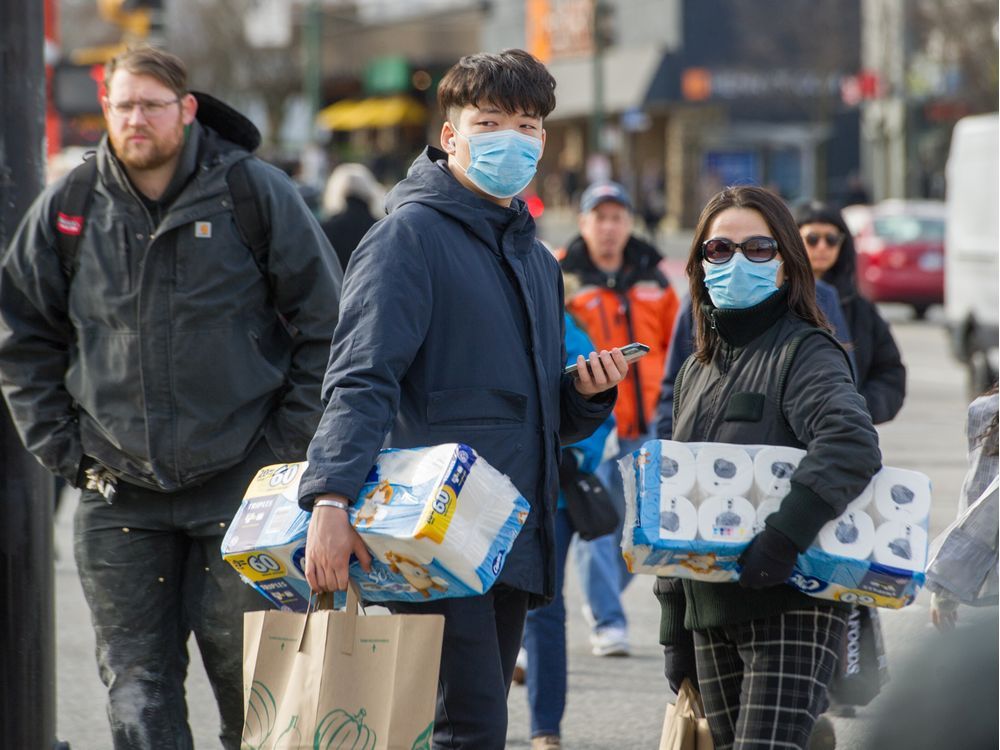COVID-19 cases remain at a trickle in B.C., but fear is having an impact

Credit to Author: Randy Shore| Date: Tue, 25 Feb 2020 01:29:24 +0000
Only a few people have contracted the COVID-19 virus in B.C., with just seven confirmed cases, but fear is driving economic impacts in the form of trade disruptions and empty malls and restaurants.
“We have seen layoffs and major interruptions to the import and export of goods to and from British Columbia (due to coronavirus),” MLA Jas Johal said during question period on Monday. “Here on the west coast, we have 40 ships at this hour that are not moving, that are not sending B.C. goods out of the province.”
Air Canada has suspended direct flights from Vancouver to both Beijing and Shanghai until March 27, and offered passengers heading to Italy the opportunity to rebook after the virus flared up there.
Small businesses are also feeling the pressure as the ethnic Chinese community in B.C. appears to be experiencing the outbreak very differently from the larger population.
Many people have access to direct reports from friends and family in the midst of China’s outbreak, Chinese social media such as Weibo and even a warning from the Chinese embassy in Canada to avoid other people.
“Avoid travelling to crowded areas as much as possible, and do not organize or participate in party activities as much as possible,” reads a warning on the Chinese-language version of the embassy’s website.
And while it echoes the advice of the B.C. Centre for Disease Control to wash hands regularly, it includes unhelpful and debunked advice that healthy people should wear masks in public.
“If you have to go to a public place with a large number of people, it is recommended to wear a mask and wash your hands and disinfect regularly,” the statement reads.
Firsthand reports from China through social media are having an impact.
“I think many (foreigners) underestimate the danger, partly because you only see news from major/official media,” wrote Mary Haojing, a prolific Tweeter on the outbreak. “However, if you understand Chinese and read more (Caixin/Wechat/Weibo), you’ll know the seriousness.”
Vancouver’s Chinese communities are being “bombarded with fearful tales of the coronavirus, true or not, that to a degree dwarfs the exposure of the rest of the city,” writes Ian Young, the Vancouver correspondent for the South China Morning Post.
Those tales have led many healthy people to take precautions out of all proportion to the actual threat here in B.C., Young notes.
Nearly 1,000 people in B.C. have been tested for the COVID-19 virus that is spreading quickly in China and more recently in Italy, Iran and Korea. There are nine confirmed cases in Canada, with seven of those in B.C.
B.C.’s seventh case of coronavirus was found in a man in his 40s located in the Fraser Health region. The man had been in close contact with a woman who had returned from Iran last week and who was announced as the province’s sixth case on Thursday.
The first five cases are all recovering or are asymptomatic.
Health authorities may use social isolation, such as school closures, to control contagion, but local cases to date have been handled through self-isolation and followup testing of people who have had contact with the infected.
“What’s happening now is overboard and unnecessary avoidance of things like Chinese restaurants and businesses,” said Steve Taylor, a professor in UBC’s department of psychiatry. “I guess it’s a ‘better safe than sorry’ approach, which although understandable is excessive and contributes to unnecessary fear.”
While social avoidance is largely concentrated in the ethnic Chinese community in B.C., it could easily spread to the larger population, he said.
“People will become more wary of foreigners and outsiders in general, and we’ve seen that already in response to people from Korea,” he said.
Israel turned back 130 passengers on a Korean passenger jet from entering the country on Sunday. Twelve Israeli passengers were allowed to disembark.
While the World Health Organization has avoided using the term “pandemic” to describe the COVID-19 outbreak, such fears are rampant on social media.
“When you hear the word pandemic, you start thinking of things like the Spanish Flu. So I think that they doing that as a fear contagion strategy,” said Taylor.
The WHO reiterated Monday that the outbreak is not a pandemic and is not spreading in an uncontained way.
“What we are seeing are epidemics in different parts of the world affecting different countries in different ways,” said Director-General Tedros Adhanom Ghebreyesus.
Advice being given to British Columbians by the provincial government and the B.C. Centre for Disease Control to wash hands and avoid touching your face feels a bit tepid next to scenes in the media of deserted streets through Wuhan, the epicentre of the outbreak.
“That kind of advice might be seen as not up to the danger posed by the infection,” said Taylor.
— with file from Stephanie Ip